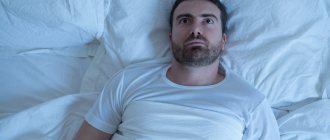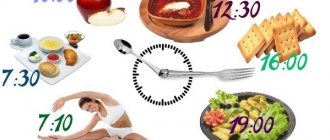Sleep is a physiological state that repeats regularly, every day. It helps the body to relax, gain strength, and restore immunity. To maintain health, a person should sleep on average 8 hours a day.
This duration may vary depending on age. Babies sleep for up to 19 hours, and older people can get by with 7-9 hours.
Deterioration in sleep quality always affects your well-being. Chronic disorders affect the health of the central nervous system. This is fraught with numerous physiological and mental pathologies.
Sleep quality can decrease for various reasons. Some of them we cannot control. But there are also some that you can eliminate on your own. Knowing them can help you improve your night's rest without resorting to therapy.
Forms of sleep deterioration
A sleep disorder associated with lack of sleep is called insomnia. In everyday life we call this insomnia. It manifests itself:
- difficulty falling asleep;
- frequent night awakenings;
- lack of feeling of vigor after sleep.
A person may feel that they slept superficially, which is no less exhausting than prolonged wakefulness. After all, deep sleep is no less important than long sleep. Spending the required amount of time in bed does not guarantee proper rest.
While some people complain about insomnia, others cause anxiety among loved ones by not waking up for 10 or more hours. Sleeping too long is equally harmful. This negatively affects performance and general well-being, and is therefore also considered a violation.
Sleeplessness. Why should you be timid and fall asleep?
According to the American Academy of Medicine's ICSD-3 sleep survey, insomnia is identified as a persistent difficulty with sleep, difficulty or difficulty sleeping. Insomnia may have no potential factors and symptoms, and its diagnosis relies on two main components:
- sleep disturbances, which arise independently from the presence of sufficient capacity for normal sleep;
- daily disruptions are directly related to poor nutrition and poor sleep (stress, emotional outbursts).
A doctor can determine the causes and signs of sleep disturbance. Sleeplessness strikes:
- chronic, which is characterized by symptoms that occur at least three times a day, lasting at least three months;
- short-term, which is no less troubling, less than three months.
How to revel in sleeplessness? Due to insomnia, most diagnoses fall into two categories:
- difficulties due to sleep patterns such as these (most often it occurs in people whose daily rhythm of life is synchronized due to factors such as disrupted rhythms or an irregular work schedule);
- Difficulties with falling asleep after a person falls asleep unexpectedly and then wakes up (often occurs in older people, as well as in people who rely on alcohol, caffeine or YouTube before bedtime).
Many women and men experience a mixture of insomnia, which includes problems with both sleep and anxiety. People who suffer from chronic insomnia may experience symptoms of mixed insomnia. Over the years, the signs of sleeplessness may change.
Based on the diagnosis, the doctor selects treatment: taking medications, cognitive behavioral therapy, switching to a healthy way of living and eating habits.
People who suffer from insomnia need to:
- take a nap during the day, especially at the end of the day;
- Avoid drinking alcohol, caffeine and thyme sprouts in the evening;
- get used to the late intake of hedgehogs;
- go in for sports every day on a regular basis;
- Maintain a consistent sleep schedule that includes the same hour of sleep and wake-up every day.
Symptoms of insomnia
Normally, a person goes to bed and falls asleep within half an hour. If you cannot fall asleep during this period of time, we are talking about presomnia disorders - there is reason to suspect insomnia. Intrasomnia disorders occur if a person wakes up in the middle of the night. However, if he opened his eyes for a minute and fell asleep again, this is not considered a pathology.
Post-somnia symptoms (associated with awakening) are the most difficult to recognize. From a scientific point of view, we can talk about them if a person wakes up 30 or more minutes earlier than he should. But when he should do this is also a question, because opportunities do not always coincide with needs.
It is impossible to definitively diagnose “insomnia” based on how long the patient sleeps. Although a duration of less than 6.5 hours is considered a deviation, the needs of the body cannot be ignored. For some, 5 hours is enough to recover.
Five Tips for Creating a Sleeping Kingdom
How to improve sleep with folk remedies? Start with decorating your bedroom!
Good mattress = good sleep
It's safe to say that a mattress is one of the important factors in the equation for a good night's sleep. From a wide range of different mattresses, choose one that will provide the comfort and support your body needs. Keep in mind that over time, the mattress begins to lose some of its functions and needs to be replaced.
Cool and fresh
If you're cold, you can always cover yourself with an extra blanket, but if you're hot and sweaty, your night's sleep will be ruined. This doesn't mean you have to run the air conditioner all night, but keeping a window slightly open can help (if it's not too hot outside, of course). Plus, the air will be fresher, and who doesn’t love sleeping outdoors?
Dim the lights
How to improve the quality of deep sleep? The answer is simple: turn off the light. Only darkness will provide deep, restorative sleep and help maintain a regular sleep schedule. The human body naturally adapts to light and darkness. Perhaps you have noticed that you feel sleepy when it gets dark outside and the morning sun in your bedroom wakes you up? We call this the biological clock, it is based on the light signals that the nerve endings in the eyes receive. If you don't want to buy heavy curtains or blinds, a sleep mask is a good solution.
No electronic devices
TV and other electronic devices emit blue light, which, simply put, signals your body to stay awake. Light from devices interferes with the body clock, which leads to poor sleep. But it's not just light, sleep can be disrupted by the information you receive and process by reading email or the news before bed. In general, if there are products that improve human sleep, gadgets are not one of them.
Get rid of the clutter
The bedroom should not be filled with things that are not functional for relaxation. Keep essentials nearby, maybe on your nightstand, but put anything else that might distract you in drawers or closets.
Types and causes of insomnia
Like most diseases, insomnia is divided into acute and chronic. Acute lasts no more than three months and comes in three types:
- transient, caused by emotional overexcitement due to upcoming events (falling in love, exams, examination);
- adaptation, provoked by psychological shocks that have already occurred (loss of job, moving, death of loved ones);
- unspecified, when it is impossible to accurately determine the mechanism of development.
Chronic insomnia is recognized if it lasts more than three months. It is always associated with somatic diseases, and in half of the cases it is accompanied by mental disorders. Insomnia affects people with diseases of the genitourinary system (the urge to wake up at night) and dermatological ailments that cause itching. Any pain prevents you from sleeping peacefully.
Get ready for bed
A good habit is to simply get ready for bed - make sure that all urgent matters are done, plans for tomorrow are made, and you are ready to relax. Here are some tips that may come in handy:
- take a warm, but not hot, bath - this will help your body reach the ideal temperature for relaxation,
- write a to-do list for the next day - this will help organize your thoughts and get rid of any distractions,
- Do relaxing exercises, such as light stretching, just don't do intense workouts before bed,
- listen to calm music,
- read, but not from your phone or computer.
Meditation can also help you relieve anxiety, pay attention to your breathing, and simply relax. Research shows that meditation and mindfulness practices can help quickly overcome minor sleep disturbances. Other studies have found that people who do these practices experience less insomnia and depression, and less fatigue.
Important☝ If insomnia bothers you for more than four weeks, you need to see a doctor.
Factors that affect human sleep
Deterioration of sleep can be caused by diseases, the situation is normalized by treatment. But there are also factors that come from outside, and a person himself allows their influence:
- Artificial light. Insufficient darkness, family members sitting in front of the computer or TV, gadgets in bed - all this makes it difficult to fall asleep.
- Load in the evening. There is no switch in the body, so it goes to sleep gradually, and not at once.
- Night shift work. It disrupts the natural biological rhythm. Normally, people sleep when it is dark and are awake when it is light. For night workers the opposite is true.
- Nervous shocks. Stress excites the nervous system. She goes into a special activity mode and postpones the prescribed rest.
The fear of insomnia will not let you fall asleep. If a person knows it firsthand, he lies in bed, fearing another painful night. And here the aforementioned stress comes in, exciting the central nervous system.
How to get rid of insomnia
Any changes in life require time and effort. Internal effort and a real desire to change the situation for the better. To get rid of insomnia, you will have to reconsider your lifestyle, first of all, paying special attention to four pillars:
- Sleep hygiene.
This is not only water procedures and ritual teeth cleaning. Sleep hygiene is a broad concept. Stop eating and drinking at least 3 hours before bedtime; in the evening, try to use dim lighting; Avoid reading books, scrolling through social media feeds immediately before bed, and do not fall asleep with the TV on; At night, turn off electrical appliances in the bedroom, if any, turn off the sound and Internet on your smartphone; - Control of emotions.
Nerves are the main cause of all human troubles and joys. Like any instrument, nerves need tuning, prevention, cleaning and strengthening. It is important not only to make daily efforts to maintain your emotional state, but also to regularly support the nervous system with vitamins. Moreover, change your attitude towards yourself by starting to observe sleep hygiene - go to bed early, ventilate the bedroom, learn how to relax before bed, so that internal dialogues do not arise in your head as a consequence of the day. - Diet.
We are what we eat. The statement is absolutely true in matters of combating insomnia. Fatty, spicy, salty foods, fast food and abuse of sugar, sweet and alcoholic drinks can have such a strong impact on the body that insomnia very quickly comes to such belly celebrations. It is better to include pumpkin and pumpkin seeds, sesame seeds, spinach, cottage cheese in your diet - such food contains amino acids and microelements that have a beneficial effect on the nervous system, and therefore on the quality of sleep. - Taking care of your health.
Physical activity, sports and general activity help the body to be in good shape, which means maintaining the level of serotonin and endorphins in sufficient quantities so that the nervous system feels good. This means your sleep will be of high quality, calm and complete. But, doing physical exercise before bed is not the best idea, because at this moment the nervous system comes into a state of excitement. In the evening, breathing practices and yoga are best.
Material factors affecting sleep
Above we looked at 5 intangible causes of insomnia, but there are also material ones. Managing them is in our hands, in every sense of the word. First of all, this is unsuitable bedding. Unpleasant tactile sensations force you to concentrate on yourself - you won’t be able to get enough sleep because of them.
To avoid deterioration of night's rest, it is better not to consume in the evening:
- Coffee and chocolate. The caffeine contained in both products inhibits the production of melatonin, the hormone responsible for falling asleep.
- Medicines that stimulate the central nervous system. These can be nootropics, antihistamines, antipsychotics. (sold by prescription)
- Alcohol (especially to help you fall asleep faster). The habituation factor plays a role here. Without additional funds, the body is no longer able to go into rest mode.
It is also better to avoid heavy meals in the evening. The fattier the dinner, the longer it will take to digest it. Until this happens, the body will not go into rest mode.
How much sleep to get enough sleep?
One of the most important rules of healthy sleep says: the optimal duration of night's rest for an adult is 7-9 hours. Only a few are able to sleep 6 hours or less without negative consequences for health and well-being. However, lack of sleep has two insidious features.
Firstly,
The consequences of lack of sleep are cumulative. A week of sleep of 6 hours or less can cause spontaneous falling asleep in the most inappropriate places (including while driving). And after two weeks of living with the same regimen, the exhaustion of the body will be the same as if you were awake for 48 hours in a row.
Secondly,
a person does not always adequately assess the decline in his own mental and physical capabilities. Many people note a deterioration in overall performance only in the first few days of inadequate rest, after which it seems to them that nothing has changed. In fact, the level of attention, the ability to concentrate, and the ability to quickly make decisions - all this continues to rapidly degrade. The irony is that many people “save” on a night’s rest in order to work longer. But at the expense of reduced productivity, this sacrifice is meaningless.
Who is prone to insomnia
Some personal characteristics become predisposing factors to the formation of insomnia. A habitual pattern of behavior and way of thinking can cause overexcitation of the nervous system, interfere with falling asleep and force you to wake up. And when a provoking factor is added to this, the problem gets worse.
Personality traits associated with insomnia include:
- perfectionism;
- anxiety;
- hypochondria;
- tendency to reflect;
- the desire to suppress emotions.
Insomnia is sometimes viewed as a reflection of chronic stress. According to research, people with low levels of happiness or lack of pleasure are prone to it.
What is more dangerous about chronic lack of sleep?
Periodic or persistent lack of sleep or disrupted sleep in children and adults threatens a host of health problems. Lack of sleep or insufficient sleep can lead to:
- low body resistance to respiratory illnesses;
- problems with the heart and vessels;
- disease of the thyroid gland and endocrine system;
- disruption of the exchange of speeches;
- decreased immunity.
The study concluded that those people who often do not sleep are more likely to experience depression, anxiety and paranoia, and those who do not sleep well.
Performance and sleep
During wakefulness, the brain uses up its energy reserve. During rest, while the excitability of neurons is reduced, it is restored. If you don’t let a person get enough sleep, this won’t happen, and in the morning he will be no less (and sometimes more) tired than in the evening.
As a result, performance, especially mental performance, and overall quality of life suffer. This manifests itself in:
- feeling tired;
- deterioration of coordination;
- attention disorders;
- memory loss;
- difficulties in mastering skills.
A sleep-deprived employee is significantly less productive than a fully rested employee. During the day, he may switch off briefly, although this sleep is unlikely to be deep. This is fraught not only with errors in work, but also with the risk of injury at work.
The effect of lack of sleep on the functioning of the nervous system
Depriving the body of sleep at night and, especially, lack of sleep for more than a day distorts the normal physiological rhythms of the body, affecting the functioning of the nervous structures. As a result, the body's vulnerability threshold drops. And with a decrease in adaptive and reserve capabilities, the body becomes more sensitive to stress: a person endures physical and psycho-emotional stress with difficulty and emotion. With a seemingly ordinary load - at work, school, in the gym - a sudden feeling of fatigue and exhaustion suddenly arises, pain and discomfort in organ systems, characteristic of autonomic dysfunction, begin to bother.
The problem may not make itself known immediately, but gradually. We often ignore mild ailments without giving ourselves rest to recuperate. If you abuse the wrong regimen, tension in the nervous system can accumulate and result in serious autonomic dysfunction and regular crises. Uncontrolled sleep disturbance - now as a consequence - will be an important signal about problems with the health of the nervous system. In this case, even having the opportunity and desire, a person is no longer able to fall asleep peacefully, sleep soundly and feel healthy and rested in the morning.
The risk group includes professions associated with daily shifts, with frequent business trips/flights/changes of time zones, as well as students during the session and people who are “convenient” to work at night: freelancers, programmers, copywriters, people who work a lot at home at computer.
Ways to improve sleep quality
A good night's rest ensures good health, high performance and emotional comfort. If insomnia is a symptom of any disease, treatment should not be delayed. And if it is caused by external factors, it is worth taking care of sleep hygiene:
- sleep at night, not during the day;
- wake up and get up at the same time - even on weekends and on vacation;
- ensure darkness - turn off the lights, draw the curtains, do not allow household members to remain in front of screens;
- relax in bed - don’t think about business, don’t pick up your smartphone, don’t watch heavy movies;
- regulate the temperature in the bedroom - optimal - 17 degrees.
If you suddenly wake up in the middle of the night and cannot fall asleep, it is better to get up for a while. You can walk around the apartment, sit in another room, the main thing is not to start vigorous activity.
Sleep characteristics in the elderly
Normal healthy sleep is as necessary as the need for oxygen and food. Thanks to adequate sleep, the nervous system and body cells are renewed.
Rest less than 6 hours is considered insufficient. Sleep disturbances cause a serious blow to the immune system and shorten life expectancy. The wide prevalence of sleep disorders in old age is well known to doctors of any specialty. In everyday practice, these complaints are so persistent and constant that the doctor often follows the lead of an elderly patient, prescribing sleeping pills, including in cases where they are unnecessary and even harmful.
Patients often notice that with age, the time it takes to fall asleep increases and sleep becomes more responsive. It is easier to wake them up in the middle of the night, but it is not always possible to immediately return to sleep after this. These are normal age-related changes. However, insomnia or, conversely, excessive daytime sleepiness are alarming symptoms at any age. Therefore, it is important to distinguish natural changes from the real problem that needs to be addressed. Insomnia can be recognized by the patient's complaints and his appearance - red eyes, depressed mood, dry lips, swelling under the eyes. Insomnia affects activity, mood and general well-being. A person develops nervousness, irritability, and outbursts of anger. Lack of adequate sleep affects family relationships, reduces attention and increases the risk of somatic diseases.
In old age, age-related changes in sleep occur. Its total duration and requirement decreases from 10 hours in youth to 7–8 hours in middle life and to 5–6 hours at the age of 70 years and older. Therefore, if an elderly person took a nap for about 1 hour after lunch, then 5 hours of sleep at night is the norm and does not require treatment, even if the patient thinks otherwise. In addition, the time to fall asleep increases, the stage of slow-wave sleep decreases, and motor activity during sleep increases. Often there is a shift in sleep phases to an earlier period, when a person experiences severe drowsiness at 20 o’clock, and at 3–4 o’clock in the morning he wakes up and can no longer fall asleep. Short periods of sleep during the day are typical. These changes are not a pathology, but an elderly person needs to get used to them.
What prevents older people from sleeping well?
In many cases, waiting too long for sleep to occur. In this case, unfavorable factors often appear that clearly manifest themselves during falling asleep: depressive mood, tension, internal anxiety, inability to switch off, fear of the night or the coming day, pain and other physical ailments.
An older person is less tired during the day due to being less busy. To sleep well at night, you need to be busy during the day (in other words, good sleep is a reward for the stress of the day).
Older people are more likely to have chronic diseases that interfere with nighttime sleep. These include chronic lung diseases, arterial hypertension, gastric ulcers, angina attacks, arthritis and joint pain, neuritis, bronchial asthma, tumors, etc.
In old age, mental disorders that impair sleep are much more common - depression, dementia, delirious episodes and their combination.
An older person often takes medications that can impair sleep. These include some cough remedies, headache tablets containing caffeine, etc. An elderly person most often does not know about their ability to worsen sleep.
Another serious problem is the excessive and uncontrolled use of benzodiazepines and barbiturates to improve sleep. These drugs quickly become addictive, and when taken haphazardly, they have the opposite effect and disrupt sleep.
A common sleep disorder in older people is sleep apnea – lack of breathing. This disorder is more common in older, overweight men. The disorder is preceded by increasing nighttime snoring, which after a few months or years turns into respiratory arrest. In the elderly, this phenomenon poses a significant danger and can cause sudden death during sleep.
How to improve your sleep quality?
As people age, they become more susceptible to stress and external factors that can interfere with normal sleep. The first step to improving sleep quality is adjusting habits (diet, alcohol consumption, physical activity) and maintaining a routine.
In older people, the “internal clock” is more sensitive to forced changes in sleep and wakefulness. Therefore, it is important, first of all, to maintain a daily routine and avoid sudden changes. You also need to pay attention to the lighting and temperature in the bedroom.
- Always wake up at the same time, even on weekends.
- Try to go to bed only when you feel sleepy.
- If you go to bed, but feel that you won’t be able to sleep anytime soon, it’s better to get up and do something in a calm environment. Return to bed when you feel sleepy.
- If you have difficulty falling asleep at night, try not to sleep during the day. As a last resort, try to sleep no later than three o'clock in the afternoon and no longer than one hour.
- Choose a nightly ritual to relax—a warm bath, reading, or a light snack.
- Make time for physical activity. Intense exercise is suitable for the first half of the day; lighter exercises can be done in the late afternoon, no later than 4 hours before going to bed.
- Follow the regime. Try to go to bed, get up, eat, exercise, and work at about the same time. Then your internal clock will work smoothly, and your well-being will noticeably improve.
- Don't overeat at night; limit yourself to a light snack shortly before bed.
- Eliminate foods and drinks containing caffeine (coffee, tea, some carbonated drinks, cocoa, chocolate), or consume them no later than 6 hours before bedtime.
- Do not drink alcohol if you feel sleepy. Even a small dose of alcohol consumed in this state can greatly impair concentration. Do not use alcohol as a sleeping pill: it can help you fall asleep, but such sleep will be short and incomplete. Alcohol should not be combined with sleeping pills and some other drugs - always consult your doctor.
- Avoid smoking before bed and during the night.
- Take sleeping pills only as directed by your doctor. If you have problems breathing during sleep (snoring, stopping breathing, waking up with a feeling of shortness of breath, headache or nausea), be sure to tell your doctor. Many sedatives and sleeping pills depress the respiratory center, so if you have respiratory problems, taking them can be life-threatening.
To combat insomnia, folk remedies and herbs are useful - mint, lemon balm, motherwort, hawthorn, valerian, St. John's wort, dill seeds. They will help make your sleep more restful, get rid of worries and anxiety.
If traditional methods of combating insomnia do not help, contact a sleep doctor and undergo an examination. Then you can be sure that the prescribed drugs are the best fit. You should not self-prescribe sleeping pills.
What are the most common sleep disorders?
- Obstructive sleep apnea (OSA) (sleep apnea) is the cessation of pulmonary ventilation during sleep for more than 10 seconds. More often it lasts 20–30 seconds, in severe cases it can reach 2–3 minutes and occupy up to 60% of the total time of night sleep. With regular apneas, usually at least 10–15 per hour, sleep apnea syndrome occurs with disruption of sleep structure and daytime sleepiness, deterioration of memory and intelligence, complaints of decreased performance and constant fatigue. OSA may be one of the causes of snoring. In this case, there is loud snoring with sighs, noisy intake of air and noticeable pauses in breathing due to airway obstruction. After a short awakening, breathing resumes. Such episodes disrupt the natural sleep process, and the next morning, although the person does not remember these micro-awakenings, he does not feel fully rested. Apnea affects one in four people over the age of 60 to one degree or another. OSA sufferers may wake up up to several hundred times a night and may feel very sleepy during the day as a result. OSA negatively affects concentration and can cause cardiovascular and pulmonary diseases, arterial hypertension and diabetes. For mild apnea, the problem can be solved by losing weight and avoiding sleeping on your back. Moderate to severe apnea requires treatment with continuous positive pressure (CPAP) therapy. A CPAP machine delivers pressurized air into the airways, keeping them open and preventing obstruction.
- Central sleep apnea (CAS) is stopping breathing during sleep due to disruption of the respiratory muscles. Patients with CSA often sigh or breathe shallowly at night, and may not snore. In the morning they complain of frequent awakenings and fatigue. Treatments for central apnea include the use of CPAP devices, oxygen therapy, and drug therapy. You should pay attention to possible side effects of treatment and be sure to consult your doctor.
- Advanced sleep phase syndrome (“Lark syndrome ” ). As a person gets older, their circadian rhythm often shifts to an earlier time. Many easily adapt to age-related changes and follow their usual routine. However, some older people notice that they get tired earlier and go to bed earlier, sometimes even before nine o'clock in the evening. Going to bed so early, they wake up long before the usual time of getting up - at three or four in the morning. This shifted sleep pattern is called “lark syndrome.” This can cause serious inconvenience in social life. A person wakes up too early, when others are still sleeping, and in the evening, when many social events take place, he already feels tired. People with advanced sleep phase syndrome often try to go to bed later, but their body clock still wakes them up early in the morning. To correct this shift, light therapy is most often used. Light exposure in the afternoon helps to shift the hours of falling asleep to a later time.
- Periodic limb movement syndrome (PLMS) and restless legs syndrome - about half of people over 65 experience twitching in the muscles of the legs (less often the arms) during the night. These contractions can be repeated up to several times per minute for several hours. MACs do not usually wake the patient, but they do disrupt normal sleep patterns. With moderate PDC, patients may not notice any changes, but with a more pronounced syndrome, they feel exhausted after sleep, complain of insomnia and daytime sleepiness. Patients with PDC also often experience restless legs syndrome – discomfort in the legs that occurs when sitting or lying down. Usually these are itchy, stabbing, pressing sensations that force a person to move his legs and massage them. The attending physician will help identify the cause of the syndrome and select the necessary drug treatment.
- Behavioral disturbances during REM sleep. Normally, during the dreaming phase, the muscles are in a relaxed state and the body is practically immobilized. In REM sleep behavior disorder, the patient literally participates in the events that he sees in his sleep. With this disorder, people jump out of bed, can break furniture, fall, causing injury to themselves and those sleeping nearby. Most of these patients are men over 50 years of age. This disorder also often occurs in those suffering from Parkinson's disease. It is necessary to consult a specialist to identify the cause of behavior disorder during REM sleep and select treatment.
- Sleepwalking and other sleep disorders often occur in older people and cause significant inconvenience to their loved ones. It is important to monitor such manifestations to eliminate the risk of injury to the patient.
Olga Karulina, doctor at the Regional Center for Medical Prevention
Medicines to improve sleep quality
It is necessary to get enough sleep from both physiological and psychological points of view. A couple of sleepless nights due to jet lag or important life events is not a cause for concern.
But if problems with falling asleep and frequent awakenings occur more than three times a week for a month, a person needs help. A good place to start is by improving hygiene. When it becomes obvious that these measures do not help, you will have to resort to medication.
It is better to take medications under the supervision of a doctor. To select them correctly, it is important to determine:
- cause of insomnia;
- her character;
- the required duration of action of the drug.
Sleeping pills provide quality deep sleep by suppressing interneuronal transmission. They also calm the nervous system and relax muscles.
Why do you experience disrupted sleep?
Disturbed sleep occurs for a variety of reasons. In most cases, sleep disorders are related to the way a person lives, their sleep and sleep patterns, and their health. The most common causes of sleep disturbance are related to disruptive behavior, the use of medications, and work habits. For example, sleep deprivation in people who work routinely leads to an increased risk of diabetes and vaginal problems.
Before signs and symptoms of sleep disturbance, pay attention to:
- extreme daytime sleepiness;
- irregular breathing;
- increased laxity during sleep;
- irregular cycle of sleep and lack of sleep;
- Difficulties due to blues.
The broadest types of sleep disturbance include:
- insomnia, for which it is important to fall asleep or fall asleep during the night after waking up;
- sleep apnea, when a person suffers from intermittent breathing, which is often accompanied by snoring;
- restless legs syndrome (RLS), which causes unpleasant sounds and twisted legs when trying to fall asleep;
- narcolepsy is a condition characterized by severe drowsiness and rough sleep throughout the day (for example, during the day).
For prompt treatment to the doctor, most sleep disorders should be rejoiced (for example, seizures if you are in a dream). Some people may not notice problems with sleep for a long time and give up, not caring about those who sleep much less, less necessary. After about an hour, women and men become restless, sometimes sleep deprived, and signs of insomnia (excessive or restless sleep) appear.
How to improve sleep with folk remedies: exercises
Stress, anxiety, and other negative thoughts that occupy your mind when you're trying to sleep have a negative impact on your ability to fall asleep and your quality of sleep. If you want to get a good night's sleep, you need to clear your mind before bed - this will help improve the quality of deep sleep and also have a positive effect on light sleep.
Breathing exercises to improve sleep
Diaphragmatic breathing (belly breathing) is especially helpful in moments when you feel tense. To perform this exercise, lie on your back and take a deep breath, pushing your stomach out as far as possible. Inhale as much air into your lungs as possible. Your belly should rise as you inhale and fall as you exhale. Diaphragmatic breathing is deeper than chest breathing. Therefore, it allows you to get more oxygen.
To improve your technique, you can use a breathing exercise technique that can guide you through the breathing cycle from start to finish.
Check
Focusing on counting is a well-known and effective practice for clearing the mind of unwanted thoughts. Just count back from 100, if you make a mistake, start over. Imagine that each number brings you one step closer to sleep. For even better results, you can combine this technique with other methods such as visualization or breathing. Counting one each time you exhale will help you stay on track and prevent you from speeding up the counting process.
Visualization
Among folk remedies for improving sleep, the power of imagination is not the least important. The idea of visualization is to focus attention on a picture or story so that the mind can let go of worries and thoughts that keep you awake. Lie down in bed, close your eyes and relax. Try visualizing an event or memory that you find calming. It could be the best vacation, a vacation spot in the mountains, an island with calming ocean waves crashing onto the beach, some repetitive activity, or even a routine activity. This method is individual - you decide what image you will create in your thoughts.
Other visualization techniques to help improve adult sleep quality use standard images or stories. Using the Sleep Dome technique, you imagine a dome-shaped shield around you, providing safety and comfort. Examine the dome, its shape, texture, size and color and customize it to your desires. Imagine that all the interfering factors are outside the protective dome, cannot penetrate the shield and will be waiting for you outside to deal with them another time.
The River of Sleep method teaches you to think about the times when you fall asleep easily, as easily as a leaf floating down the stream. The idea is that your subconscious already knows the path to restful sleep. Imagine yourself floating like a leaf on a gentle stream, allow yourself to be immersed in the flow - your subconscious path to deep sleep.
A calm state of mind is truly medicine for improving sleep. It can be achieved using methods that have worked for centuries. Anyone can practice at home, although it may take time to achieve perfection. Such methods are mantra meditation, Vipassana meditation, conscious breathing.









